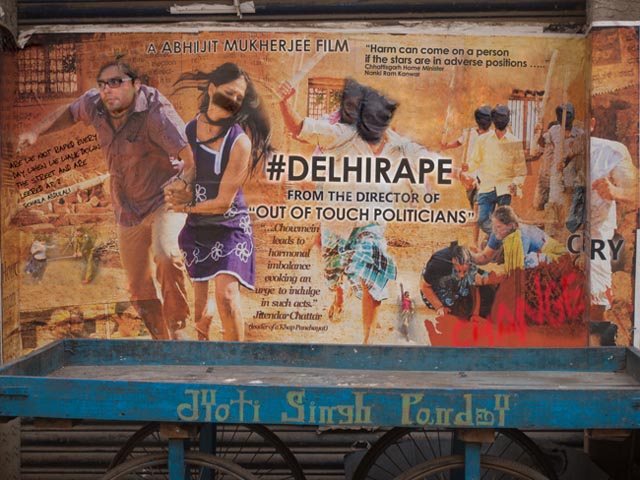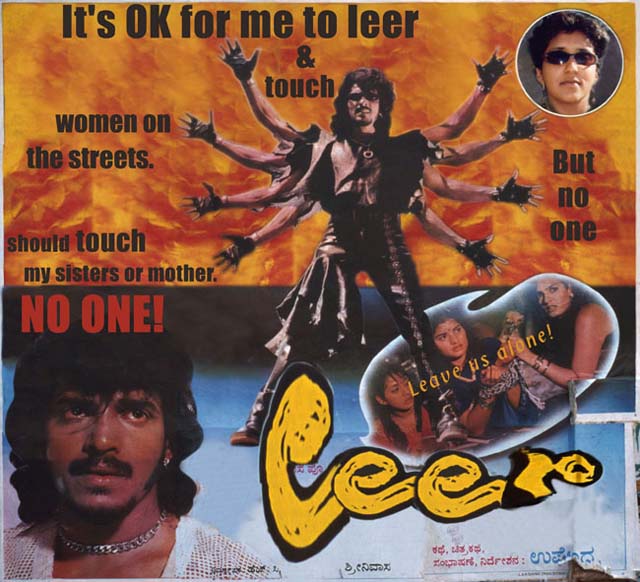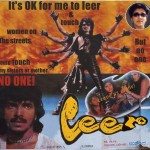
Annu Palakunnathu Matthew – Bollywood Satirized
The more things change, the more they remain the same. Annu Palakunnathu Matthew is an America-based artist who grew up in Kerala. In the late 1990’s she made a portfolio titled Satirizing Bollywood, about her memories of her life as a woman in India. She calls it her ‘Angry Woman’ years. Misogyny and a patriarchal society existed then, and as the recent gang rape and unending cases of abuse of women prove, nothing much has changed. Now two decades later, Matthew has taken on the subject again.
“I spent the first 10 years of my life in England before moving to India. As a result, I noticed a difference in attitudes towards women in England as compared to India. That and what I experienced as a young woman growing up in India led to the work Bollywood Satirized.”
Her surrealistic Bollywood movie posters are a parody and critical commentary of her experiences as a woman in India. Using digital technology, Matthew adds layers to the original Bollywood posters by adding in images of herself and text from varied source, challenging gender roles and other ugly aspects of Indian society.
Tongue in cheek, these color-drenched documents are a scathing critical commentary on women’s roles. Back in the 1990’s, when I had interviewed her in New York, she had told me: “It’s about how I felt more like a commodity than a person looking for a life partner, especially with the dowry system in my community where a lot of people wouldn’t even consider looking at a girl unless she can pay a certain amount of money.”
Christiane Paul, curator of New Media Arts at the Whitney Museum of American Art wrote, “Annu Palakunnathu Matthew’s work focuses on the politics of gender and race. The posters use the traditional visual language of the movie industry’s ‘dream factory’. Inscribed with text that draws attention to gender and cultural stereotypes as well as nuclear politics, Matthew’s posters deconstruct the creation of message and context through visual images.”
Abuse of the Girl Child, Dowry, Sexual Assault…
Matthew, who is a professor of Art (photography) at the University of Rhode Island, has had exhibitions in a number of venues, including Sepia International, New York City, the 2009 Guangzhou Biennial of Photography, China and Gallery Z20 in Rome, Italy. Her work can be found in the collection of the George Eastman House, Fogg Museum at Harvard, Museum of Fine Arts in Houston, Center for Creative Photography and the RISD Museum among others.
From abuse of the girl child to dowry to violence against women, all the problems facing Indian women seem to be as ferocious as ever. Matthew, who showed new work in ‘Bollywood Satirized’ at Tasveer Gallery in India in the aftermath of the gang-rape of Delhi student Jyoti Singh Pandey, says: “It is obvious that a lot hasn’t changed for most women in India. Women have come out in droves to oppose the daily harassment that they endure and in response to the horrific incident, as well as our politicians lack of response.”
She adds, “To me and many other commentators, it is obvious is that what is needed is a cultural shift of attitudes by both men and women. Expecting women to, for example, wear long overcoats is not a serious way to resolve the problem.”
Asked about her thoughts on the recent soul-searching in India after the gang rape, she says: “Unfortunately incidents like this happen all the time but this one struck a nerve. First, because of the extreme brutality but also because she was an aspiring middle-class woman, someone many of us can relate to.
I think social media played a large role in mobilizing people to protest and demand change. I hope this tragedy prevents such incidents from re-occurring and it creates a shift in cultural attitudes towards women. The Verma Committee report is a huge first step if in fact it is implemented.”

Chow Mein Causes Rape & Other Myths
How has Bollywood Satirized been received in India? “So far, very well,” says Matthew. ” I think there has been a more positive response compared to 10 years ago. I have started putting it up on the walls in Bangalore and people initially think they are actual posters. But when they read them they get the message.”
What are her hopes for attitudes changing in India? “I am always the optimist but when I read some of the politicians’ responses, like blaming chow mein for increases in rape or advising women to wear long overcoats, I sometimes fear I don’t live in the India that I think I know and love.”
Currently she is in India on a Fulbright Fellowship. She is working on a project to explore the experience of families affected by the Partition, so that their stories are not forgotten.
“The work will give a face to these families and includes excerpts from their experiences,” she says.
“I am not the only one to think that a lot of the violent incidents since 1947 have been echoes and reverberations from the trauma of Partition. I will create work that is accessible to a larger audience and make these stories part of our history. The work will address our violent history in order to hopefully not repeat it.”
Related Articles:
SAWCC-The World of South Asian Women Artists






